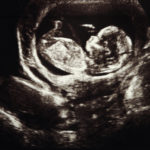What’s going on?
You are now in the last week of the first trimester, and things should get better for you from now onwards. This week may also mark the first time that you will be seeing your baby in his/her full form (as opposed to a sac during the last appointment) through an ultrasound scan.
Baby at Week 12
By now, your baby measures 6cm long – about the size of a small plum – and is fully formed. Can you believe that he/she has more than doubled in size over the past 3 weeks? Having said that, your little one is all set to grow even bigger and practice his/her breathing and sucking motions.
At 12 weeks, your baby’s skeleton is made from cartilage (the ‘soft bone’ you’d find in your nose and ear), but this is set to harden into bone in the weeks ahead. At birth, a baby will have over 300 parts of bone and cartilage, but this will reduce to 206 in adulthood, as bones join to form larger, stronger units.
Apart from the skeleton, your baby’s digestive system is also hard at work as it starts practicing contraction movements – a beneficial skill that your little one will need after birth to push food through the digestive tract. The bone marrow is producing white blood cells which will help in fighting infection once your baby is out of the womb (yes, including the germs circulating in the child care centre). Baby’s kidneys are starting to excrete urine into your bladder (expect more toilet trips), and the intestines are moving back into the abdominal cavity (for the longest time, they were protruding into the umbilical cord).
Also happening this week: your baby is starting to practice his/her reflexes this week by curling fingers and toes, clenching eye muscles and making sucking movements with his/her mouth. You might not feel your baby moving yet, but if you poke your stomach, your baby will respond by wriggling.
What is mum up to?
Throughout your pregnancy, the placenta produces the hormone progesterone, which relaxes the valve that separates the esophagus from the stomach. This could cause the gastric acid to flow back up the pipe – especially when you are lying down – which brings with it an uncomfortable burning sensation. For most women, the occurrence of heartburn often begins during the later stages of pregnancy when the growing uterus starts to push against the stomach. However, for some, this discomfort can start as early as the first trimester.
On a brighter note, your friends and loved ones around you might have mentioned something about you having that “pregnant glow”. No, it’s not merely the joy you feel from having a bun in the oven – there’s a scientific explanation behind your radiant skin. As you might have known, your body gets an increase of blood volume alongside the pregnancy hormones – both of which contribute towards giving you that glow. With an increasing blood volume, more blood gets pumped to the blood vessels while the hormones increase oil gland secretion. As a result, you will enjoy a flushed, more plump and smoother skin appearance, but do take note that sometimes the increased oil gland secretion may cause temporary acne.
Top tips for Week 12
If you noticed that you are having increased milky white vaginal discharge than usual, not to worry, as this is common during pregnancy.
This odourless or mild-smelling milky discharge is called leukorrhea, and there is now a lot more of it due to increased estrogen production and blood flow to the vaginal area. Vaginal discharge during pregnancy consists of secretions from the cervix and vagina, old cells from the walls of the vagina, and normal bacterial flora from the vagina.
While generally harmless, do take note and inform your doctor right away if you experience any of the following symptoms:
- You have yet to reach the 37th week of pregnancy and you notice an increase in discharge or a change in the type of discharge (i.e. it becomes watery, mucus-like or tinged with pink or brownish blood) – this could be a sign of pre-term labour
- You have odourless, whitish discharge that is causing discomfort such as pain when urinating or while having intercourse, soreness, itching or burning – or if your vulva looks inflamed. This could signal a yeast infection.
- You seem to have a thin white or grey discharge with a fishy smell after sex (when mixed with semen) – this could be a type of vaginal infection called bacterial vaginosis.
READ NEXT
























